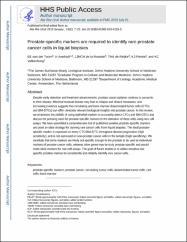| dc.contributor.author | van der Toom, Emma E. | |
| dc.contributor.author | Axelrod, Haley D. | |
| dc.contributor.author | de la Rosette, Jean J. M. C. H. | |
| dc.contributor.author | de Reijke, Theo M.M. | |
| dc.contributor.author | Pienta, Kenneth J. | |
| dc.contributor.author | Valkenburg, Kenneth C. | |
| dc.date.accessioned | 10.07.201910:49:13 | |
| dc.date.accessioned | 2019-07-10T19:49:53Z | |
| dc.date.available | 10.07.201910:49:13 | |
| dc.date.available | 2019-07-10T19:49:53Z | |
| dc.date.issued | 2019 | en_US |
| dc.identifier.citation | van der Toom, E. E., Axelrod, H. D., de la Rosette, J. J. M. C. H., de Reijke, T. M. M., Pienta, K. J. ve Valkenburg, K. C. (2019). Prostate-specific markers to identify rare prostate cancer cells in liquid biopsies. Nature Reviews Urology, 16(1), 7-22. https://dx.doi.org/10.1038/s41585-018-0119-5 | en_US |
| dc.identifier.issn | 1759-4812 | |
| dc.identifier.issn | 1759-4820 | |
| dc.identifier.uri | https://dx.doi.org/10.1038/s41585-018-0119-5 | |
| dc.identifier.uri | https://hdl.handle.net/20.500.12511/1807 | |
| dc.description | WOS: 000455051200006 | en_US |
| dc.description | PubMed ID: 30479377 | en_US |
| dc.description.abstract | Despite improvements in early detection and advances in treatment, patients with prostate cancer continue to die from their disease. Minimal residual disease after primary definitive treatment can lead to relapse and distant metastases, and increasing evidence suggests that circulating tumour cells (CTCs) and bone marrow-derived disseminated tumour cells (BM-DTCs) can offer clinically relevant biological insights into prostate cancer dissemination and metastasis. Using epithelial markers to accurately detect CTCs and BM-DTCs is associated with difficulties, and prostate-specific markers are needed for the detection of these cells using rare cell assays. Putative prostate-specific markers have been identified, and an optimized strategy for staining rare cancer cells from liquid biopsies using these markers is required. The ideal prostate-specific marker will be expressed on every CTC or BM-DTC throughout disease progression (giving high sensitivity) and will not be expressed on non-prostate-cancer cells in the sample (giving high specificity). Some markers might not be specific enough to the prostate to be used as individual markers of prostate cancer cells, whereas others could be truly prostate-specific and would make ideal markers for use in rare cell assays. The goal of future studies is to use sensitive and specific prostate markers to consistently and reliably identify rare cancer cells. | en_US |
| dc.description.sponsorship | NCI [F32CA206394, U54CA143803, CA163124, CA093900, CA143055]; Prostate Cancer Foundation; Patrick C. Walsh Fund; Cure for Cancer Foundation | en_US |
| dc.description.sponsorship | This work is supported by NCI grants U54CA143803, CA163124, CA093900, and CA143055 as well as the Prostate Cancer Foundation, the Patrick C. Walsh Fund and a gift from the Stutt family. E.E.v.d.T. is supported by the Cure for Cancer Foundation. K.C.V. is supported by NCI grant F32CA206394. | en_US |
| dc.language.iso | eng | en_US |
| dc.publisher | Nature Publishing Group | en_US |
| dc.rights | info:eu-repo/semantics/openAccess | en_US |
| dc.subject | Prostate-Specific Markers | en_US |
| dc.subject | Prostate Cancer | en_US |
| dc.subject | Circulating Tumor Cells | en_US |
| dc.subject | Disseminated Tumor Cells | en_US |
| dc.subject | Rare Cells | en_US |
| dc.subject | Bone Marrow | en_US |
| dc.title | Prostate-specific markers to identify rare prostate cancer cells in liquid biopsies | en_US |
| dc.type | review | en_US |
| dc.relation.ispartof | Nature Reviews Urology | en_US |
| dc.department | İstanbul Medipol Üniversitesi, Uluslararası Tıp Fakültesi, Cerrahi Tıp Bilimleri Bölümü, Üroloji Ana Bilim Dalı | en_US |
| dc.authorid | 0000-0002-6308-1763 | en_US |
| dc.identifier.volume | 16 | en_US |
| dc.identifier.issue | 1 | en_US |
| dc.identifier.startpage | 7 | en_US |
| dc.identifier.endpage | 22 | en_US |
| dc.relation.publicationcategory | Diğer | en_US |
| dc.identifier.doi | 10.1038/s41585-018-0119-5 | en_US |
| dc.identifier.wosquality | Q1 | en_US |
| dc.identifier.scopusquality | Q1 | en_US |


















